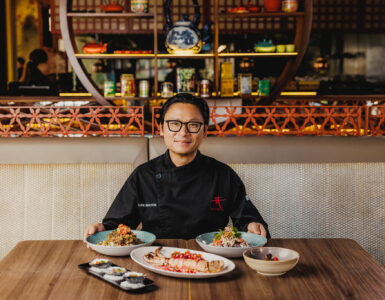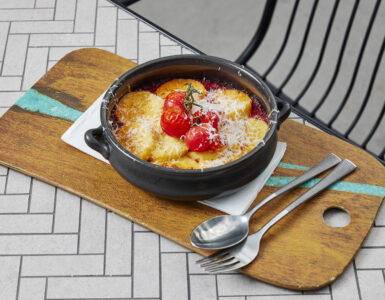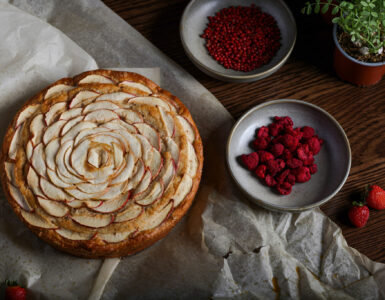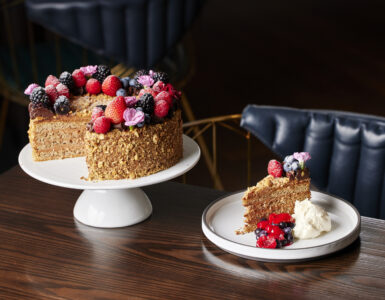Luke Nguyen, executive chef of Fat Noodle, shares the food lessons he learnt from his childhood.
Joyfully referring to himself as a ‘boat person’, celebrity chef Luke Nguyen distinctly remembers a childhood centred around fresh produce and flavoursome food. Born in Vietnam, Luke’s parents emigrated to Australia when he was only one year old – so he has no memory of life in Vietnam. Growing up in Cabramatta in Sydney’s south-west and working at his parents’ Vietnamese restaurant from the age of six, however, meant his education in Vietnamese cuisine and culture was firmly established from the get-go.
“I grew up in a very traditional, strict Vietnamese family,” says Luke, who is executive chef of Fat Noodle at The Star Sydney and Treasury Brisbane. “This meant eating very well, going to the produce markets every morning and learning how to cook.”

As a six-year-old, tending to the giant pho stock pot each day was Luke’s first introduction to working in a restaurant kitchen. “Growing up in a migrant family, my parents worked really hard and so the children had to help out,” he says. “That’s where I learned to cook. And that’s where the passion and the dream of opening my own restaurant came about.”
Although most days were spent in the kitchen of the family restaurant, Luke remembers Sunday lunches were a sacred time for the family to hit pause and enjoy a meal together. “We did breakfast, lunch and dinner at the restaurant,” says Luke. “So, the weekends were always great, especially Sunday. I think the gatherings were very much about, not just eating, but it was about communicating and it was about spending time with the family.”
Being the son of two excellent cooks meant that much of the family bonding centred around food. “We would communicate through food,” Luke says, “that was our language that we would speak.” Luke’s dad was known as the King of slow cooking, slaving over a large crock pot for hours to create flavourful broths. The quick stir fries, light salads and fresh rice paper rolls – synonymous with Vietnamese cooking – were Luke’s mother’s domain.

“I think when you grow up in Vietnam, food is a massive part of your upbringing and it’s a major part of your culture as well. So, it was ingrained in my parents as children. Both sides of the family specialised in the wholesale fruit and vegetable business.”
Sunday lunch at Luke’s house meant an abundance of fresh produce – fresh seafood, bean sprouts, choy sum, okra, bok choy and fresh herbs. “I remember as a kid, our table was sometimes not big enough. So, we would just sit on the floor – and I’m sure a lot of Vietnamese families can relate to this.” A hot pot would be the centrepiece, with lots of noodles and dipping sauces scattered around the large table or picnic mat (if the food couldn’t all fit inside).
Luke’s mum’s tamarind-based soup (canh chua) holds a special place in his heart – and is still something only his mum can get right. “Sometimes she would cook it in a big pot, but sometimes we would cook it together, like a hot pot, which was great,” says Luke. “I think this dish essentially describes what Vietnamese cuisine is all about. It’s really light, the balance of flavours is fantastic. It’s got the tamarind, which has a tart sourness to it. It has fish sauce, which gives that salty element and umami flavour; it has pineapple, which gives it that nice sweetness as well, and it’s got tomatoes, okra, loads of fresh herbs and vegetables.”
Although his mum’s soup is a solid favourite, pho was the first dish that Luke learnt how to cook as a six-year-old, perched on a milk crate in his family’s restaurant. “I was forced to wash the bones – and I say forced because I didn’t like doing it. When the bones came in, and we’re talking 20kg or 30kg of bones, I had to scrub them clean with a brush. Because if you don’t clean the bones well, the broth, the soup itself is going to be quite murky.”

After cleaning the bones Luke would dry roast the spices, char grill onions and ginger and feel and chop everything before throwing it into the giant pot. “I would stack the milk crates up and start tending to the stock – sometimes I say cradling because it’s like looking after a baby. You really need to skim all the impurities off and make sure that it doesn’t over boil.”
“Then eight to 10 hours later, you’ve got this beautiful broth that you would add your soft rice noodles to and your slow-cooked brisket that you cooked into the broth as well. And it’s such a delightful dish to eat. I used to have pho for breakfast, lunch or dinner,” says Luke.
Luke Nguyen
One of Australia’s top celebrity chefs, Luke Nguyen, is the culinary mind behind Fat Noodle at The Star Sydney and Treasury Brisbane and head chef and owner of the award-winning Red Lantern Vietnamese. Luke is also a best-selling author and renowned TV host of shows including Luke Nguyen’s Vietnam. Luke’s inspiration for Fat Noodle comes from his Vietnamese heritage and family history in China, with both countries reflected in the taste combinations and fusion of flavours.
We thought you might like…






